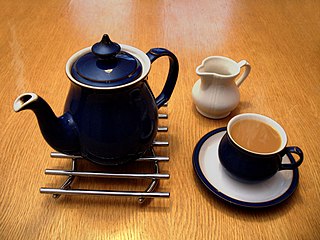
A drink is a liquid intended for human consumption. In addition to their basic function of satisfying thirst, drinks play important roles in human culture. Common types of drinks include plain drinking water, milk, coffee, tea, hot chocolate, juice and soft drinks. In addition, alcoholic drinks such as wine, beer, and liquor, which contain the drug ethanol, have been part of human culture for more than 8,000 years.
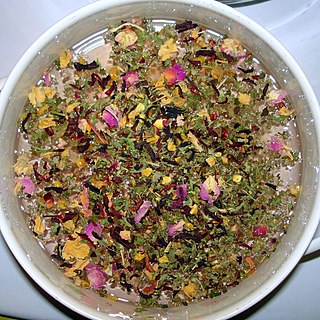
Herbal teas—less commonly called tisanes —are beverages made from the infusion or decoction of herbs, spices, or other plant material in hot water. The term "herbal tea" is often used in contrast to true teas, which are prepared from the cured leaves of the tea plant, Camellia sinensis. Unlike coffee and true teas, most tisanes do not contain caffeine naturally.

Instant coffee, also called soluble coffee, coffee crystals, and coffee powder, is a beverage derived from brewed coffee beans that enables people to quickly prepare hot coffee by adding hot water or milk to the powder or crystals and stirring. Instant coffee is commercially prepared by either freeze-drying or spray drying, after which it can be rehydrated. Instant coffee in a concentrated liquid form is also manufactured.

Iced tea is a form of cold tea. Though usually served in a glass with ice, it can refer to any tea that has been chilled or cooled. It may be sweetened with sugar, syrup and/or apple slices. Iced tea is also a popular packaged drink and can be mixed with flavored syrup, with multiple common flavors including lemon, raspberry, lime, passion fruit, peach, orange, strawberry, and cherry.
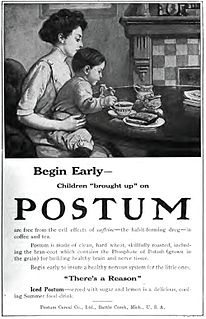
Postum is a powdered roasted-grain beverage popular as a coffee substitute. The caffeine-free beverage was created by Post Cereal Company founder C. W. Post in 1895 and marketed as a healthier alternative to coffee. Post was a student of John Harvey Kellogg, who believed that caffeine was unhealthy. Post Cereal Company eventually became General Foods, which was merged into Kraft Foods. Eliza's Quest Foods now owns the trademark rights and secret recipe of Postum.

Barley tea is a roasted-grain-based infusion made from barley which is a staple across East Asian regions like China, Japan, Korea, and Taiwan. It has a toasty, herbal flavor.

Oksusu-cha (옥수수차) or corn tea is a Korean tea made from corn. While oksusu-suyeom-cha (옥수수수염차) or corn silk tea refers to the tea made from corn silk, oksusu-cha can be made from corn kernels, corn silk, or a combination of both. The caffeine-free infusion is a popular hot drink in winter. Along with bori-cha, oksusu-cha is one of the free grain teas served in many restaurants in place of water.

Sungnyung is a traditional Korean infusion made from boiled scorched rice.
Barleycup is an instant cereal drink, available in the United Kingdom, Ireland, Norway, Sweden, Denmark, Malta and Hong Kong. Barleycup was manufactured by the British company Ridpath Pek Ltd., until it was acquired in 2004 by the American firm Smithfield Foods Inc. and merged with Norwich Food Company Ltd. to form Smithfield Foods Ltd. UK. In 2013 the Barleycup brand was purchased by “Grana” Sp. z o.o., the company that had earlier been the manufacturer of beverages produced under this brand. The packaging and labels were modified in the same year.
Barley water is a traditional drink consumed in various parts of the world. It is made by boiling barley grains in water, then (usually) straining to remove the grains, and possibly adding other ingredients, for example sugar.

Lei cha or ground tea is a traditional Southern Chinese tea-based beverage or gruel. The custom of Lei cha began in the Three Kingdoms period or even Han Dynasty. It is very prevalent among Hakka people in Hakka regions of Taiwan. It is brought by Hakka people to Taiwan, Indonesia, Malaysia, and any locales with a substantial Hakka diaspora population. Besides Hakka Lei cha, Lei cha is also very traditional among Hunanese people in Northern part of Hunan Province of Mainland China. So, the Lei cha custom in China has two different kinds: Hakka Lei cha; and Hunan Lei cha.

Coffee substitutes are non-coffee products, usually without caffeine, that are used to imitate coffee. Coffee substitutes can be used for medical, economic and religious reasons, or simply because coffee is not readily available. Roasted grain beverages are common substitutes for coffee.
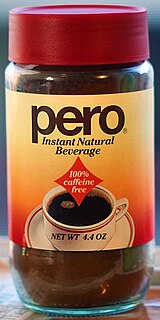
Caro is a brand of roasted grain drink, a caffeine-free coffee substitute made of roasted barley, malted barley, chicory, and rye. It is manufactured by Nestlé and was first introduced in West Germany in 1954. It is available throughout Europe as well as other markets including New Zealand and Australia. It is imported to the United States under the name Pero and sold in Spain as Eko.
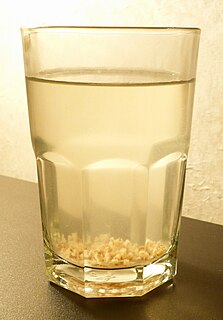
Brown rice tea, called hyeonmi-cha in Korean and nước gạo lứt, nước gạo lứt rang, or nước gạo rang in Vietnamese, is an infusion made from roasted brown rice.

Caffè d'orzo or barley coffee is a type of hot drink, originating in Italy. Orzo is a caffeine-free roasted grain beverage made from ground barley. It is an espresso-style drink, and when prepared from the roasted barley directly, it can easily be made in typical espresso machines and coffeemakers. In Italy it is widely available in coffee vending machines. Although traditionally considered a coffee substitute for children, it is an increasingly common choice in Italy and other places for those who choose to eschew caffeine for health reasons.

Misu (미수) is a beverage made from Korean traditional grain powder, misu-garu which is a combination of 7–10 different grains. It is usually served in the hot summer days to quench thirst or as an instant nutritious drink for breakfast or as a healthy snack.
Inka is a Polish roasted grain drink. Developed in the late 1960s Inka has been produced in Skawina since 1971, a centre of coffee production since the early 20th century. Currently it is manufactured by GRANA Sp. Z O.O. While it was used in part as a coffee substitute to alleviate coffee shortages in the 1970s, Inka remains popular, in part because it is caffeine-free. It is exported to Canada and the United States as Naturalis Inka in packaging reminiscent of that used in Poland in the early 1990s.

















